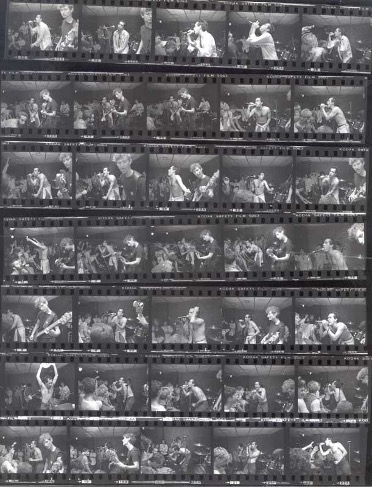Trigger warning: mutilation
The Dead Milkmen were a punk rock band from Pennsylvania, known for their clever and often crass joke lyrics and for singing in their native Philadelphia accents. They became well known to college radio listeners, satirizing American politics, British post-punk and new wave rock, and misbehaving college kids. After gaining a cult following in the 1980s, the band dissolved in 1995, though most members remained in Philadelphia. Their song ‘Beach Party Vietnam’, written a full eleven years after the Vietnam War ended, appeared on their sophomore album, Eat Your Paisley. The song, which contains spoken exchanges between two band members (playing the characters in the song), is rife with double entendre and sharp political humor.

The song makes frequent reference to beach films, a subgenre from the late 1950s and early 1960s which took place almost entirely on California beaches and featured surfing, cars, and blatant misogyny. The two main characters in the song are named Frankie and Annette, likely a reference to Frankie Avalon and Annette Funicello, two actors who frequently starred in beach films. Before the two can spend much time together, Frankie ‘got a letter from his Uncle Sam‘; in other words, he was drafted for the Vietnam War, by a character frequently used on recruitment posters during World War I. The song refers to the Vietnam War as a ‘beach party’, and the surfer rock-derived music adds to this aesthetic. The effect of this is to create a juxtaposition between the events of the war as they really were–bloody, violent, and fueled by racism and prejudice–with the aesthetics and feel of a beach film–carefree, comedic, and light.
The use of double entendre and violent imagery helps craft this juxtaposition and serves the song’s ultimate message. The chorus refers to ‘cooking hot dogs with napalm’, a prime example of its irony and juxtaposition. The idea of a mundane activity associated with the beach and especially with beach films, such as cooking hot dogs, with napalm, a dangerous chemical used by Americans in the Vietnam War, is both uncomfortable and darkly wry. The effects of napalm were obviously fatal, and this is indicative of the song’s message as a whole: despite the light, carefree imagery of a beach film, the consequences of war are dire, violent, and brutal. Many of the lyrics in the song have double meanings, and some are more pointed than others. Near the end, the singer proclaims that at the beach party, ‘there’s gonna be a wiener roast’. This visceral image applies to several aspects of the song and of the war it refers to. Disguising itself as a reference to hot dogs, the line implicitly refers to the destruction of masculinity during the Vietnam War.

The song’s light imagery is the band’s satire toward Western, and particularly American, war propaganda in the second half of the twentieth century. Drawing on the period from the wave of McCarthyism in the 1950s, which used a fear of communism to further Senator Joseph McCarthy’s reactionist policies, to Reagan’s War on Drugs campaign in the 1980s, which unfairly targeted and jailed black people, The Dead Milkmen pinpointed a tendency for propagandist media to put a cheerful sheen over what were truthfully brutal and sometimes violent campaigns. In Beach Party Vietnam, they arguably took this observation to its most extreme logical point, thereby revealing the truth at the heart of the propaganda: the need to make palatable an inherently abhorrent act. The Dead Milkmen’s aim was not necessarily to create peace, but rather to point out the role played by various media in creating an illusion of security, stability and peacefulness while legitimising and promoting acts of extreme violence.
What do you think?
- What role can satire play in resisting conflict and building peace?
- What kind of impact can popular culture such as rock songs and music videos have on how we think about war and peace?
- How can reflecting on past propaganda help us develop better peace-building tools for the future?
- Who are the main targets of satire/criticism in ‘Beach Party Vietnam’, and to what extent are ordinary people (the song’s listeners) implicated?
If you enjoyed this item in our museum…
You might also enjoy Dad’s Army: Pockets of Peace and Humour, Addressing Ahmadinejad, ‘To be or not to be‘, and other items with the tag ‘resistance‘.
Arden Henley, December 2022